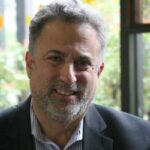Rabbi Moshe Rudin, spiritual leader of Adath Shalom, presented a two-part Our Jewish World series titled “Israel Sacred Spaces, Hidden People,” on Thursday, April 11 and 18, at 1 p.m. via Zoom.
The series, which was free and open to the public, was coordinated by Our Jewish World co-chairs Melanie Levitan and Ilene Dorf Manahan.

Rabbi Moshe Rudin
Session 1, on April 11, focused on “Secret Space, Sacred Space.” Speaking about this session, Rabbi Rudin noted, “We will survey some of the lesser-known sacred spaces in and around Jerusalem from biblical times to the present. While most of us are familiar with the Western Wall, the Temple Mount, and the Western Wall tunnels, there are so many other places in the Holy City that carry sacred traditions and practices that can help us understand how Judaism isn’t just holiness in time: It’s holiness in space. We will learn how some of these holy spaces radiate meaning into our own practice of Judaism in the Diaspora.”
For session 2, titled “Hidden People of Jerusalem,” the rabbi will delved into people of all faiths, races, practices and histories, who call Jerusalem home. He pointed out that, “Among this incredible human tapestry are some groups and individuals who carry secrets and lead lives of concealed spirituality. We’ll get to know a few of these groups, some with ancient histories rooted in controversy and secrecy and others who hide in plain sight. Jerusalem is a city of visions and visionaries. Let’s take a look at some of her mysteries and the people who embody them.”
Originally from New England and with roots in Conservative Judaism, in which he was raised, Rabbi Rudin studied at Boston University before transferring to Haifa University. His rabbinic ordination is from the Academy for Jewish Religion, a rabbinical school whose focus is on preparing rabbis and cantors for service to the Jewish people regardless of their affiliation or involvement.
Rabbi Rudin seeks to make prayer and Torah accessible to congregants through means as varied as music (he enjoys playing guitar), drama, literature, art, discussion, meditation, cooking, and, of course, classical text study. Placing the highest value on building individual relationships and strengthening connections, and creating a rabbinate of engagement, he worked to generate active attendee involvement during this presentation.
